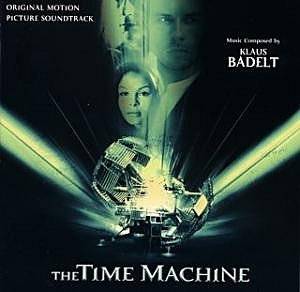Klaus BADELT
The Time Machine
OST; additional music by Geoff Zanelli * vocalist - Katy Stephan
VARÉSE SARABANDE VSD-6337 [57:35]

HG Wells' novella The Time Machine (1894) is of course a classic of English literature and the first great work of the most significant genre of the modern age, science fiction. It has already been made into an entertaining film in 1960 by George Pal, and one with a good score by Russell Garcia, a cue from which can be heard on this month's The Science Fiction Album. Given the importance of the original one would hope any new film, and especially one which started out being directed by Well's grandson, Simon*, would pay due respect to Wells' genius. Unfortunately The Time Machine (2002) is like other recent science fiction remakes, Planet of the Apes (2001) and Rollerball (2002), a dumbed down flick aimed squarely as SFX and action mad 13 year old American boys. Hence we have the usual American anti-British cultural imperialism, whereby the story is transferred to New York without word of apology, and the usual idiotic, nonsensical plotting. Any ideas from Wells which survive amid the clichés cling on by their fingernails.
The score is by Klaus Badelt, an unfamiliar name, though Hans Zimmer fans may have spotted his credit for providing additional music on, among others, Mission: Impossible 2 (2000), Gladiator (2000), Hannibal (2001) and Pearl Harbor (2001). Badelt has also scored The Pledge (2001), Extreme Days (2001), Equilibrium (2001) and K-19 The Widowmaker (2002). For The Time Machine he has crafted a big, old fashioned romantic orchestral score which is thoroughly professional, often appealing in a conventional way, and utterly devoid of originality. But then, given the nature of the film one would hardly expect anything else; Zimmer is of course Dreamworks composer-in-chief, and this is a second rank Dreamworks production, deemed not worthy of the master's touch. That said, Badelt has written an enjoyable orchestral score free of the electronics which Zimmer would probably included, and this in itself is mildly refreshing.
The rousing, resolute main theme has a grandeur akin to Holdridge's Into Thin Air: Death on Everest (1997) - especially during the cue "I Don't Belong Here" - while the Eloi theme, which comes complete with chanted vocals can only remind one of John Williams' Amistad (1997) anthem. Other pieces such as "Morlock's Attack" echo Danny Elfman's furious Planet of the Apes, while the finale, "Godspeed" adds the all purpose Hollywood Celtic sound to a setting of the main theme. One might even find in the penultimate "What If?" strong parallels with the penultimate cue from Williams current Attack of the Clones album, though obviously this must be coincidental. Yet despite all these similarities to previous scores there is a wealth of thematic material and some interesting musical ideas amid the generic stylings. This is far from a dull and repetitive monothematic score, Badelt perhaps trying to prove just how much he can do in his first big solo outing.
It is clear Badelt is a very talented composer just waiting for the chance to score something more interesting, while melodically rich as this current project is, it is also essentially second-hand, the composer yet to make his individual mark. Meanwhile this is just the sort of well made big, bold generic score which many fans will lap up, and is certainly at least as worthwhile as many comparable efforts by far better known composers. I look forward to Badelt doing something new, and while this is a worthwhile CD, for first rate music for The Time Machine acquire Miklós Rózsa's Time After Time (1979) post haste.
*The film was mostly directed, uncredited, by Gore Verbinski, responsible for Mouse Hunt (1997) and currently perpetrating a remake of the cult Japanese horror movie, Ringu (1998). Doesn't Hollywood have any new ideas?
Gary S Dalkin

Return to Index